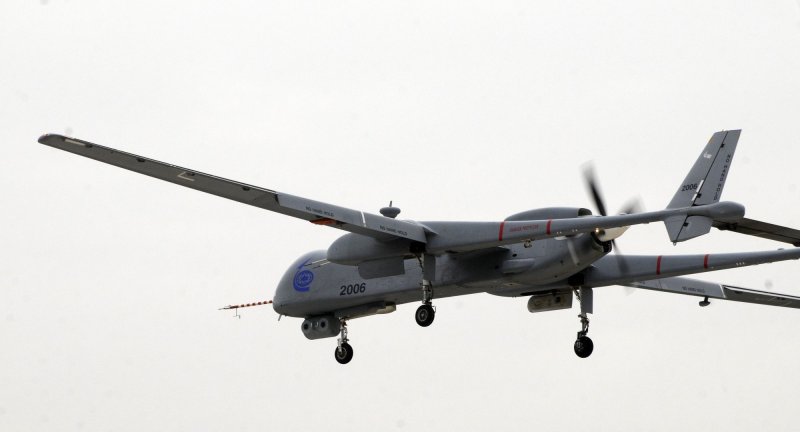An Israeli made unmanned aerial vehicle, the Heron TP, flies during it's induction ceremony into the Israeli Air Force at the Tel Nof Air Force Base, February 21, 2010. The large drone is built by the Israel Aerospace Industries, IAI, and is capable of flying to Iran. It has a wingspan of 86 feet, the size of a passenger jet and can fly 20 consecutive hours. The drone is primarily used for surveillance and carrying payloads. UPI/Debbie Hill |
License Photo
TEL AVIV, Israel, Oct. 15 (UPI) -- Israel Aerospace Industries has signed a $400 million contract to sell unmanned surveillance drones to Russia, a deal intended to boost relations between the two countries and, Israelis hope, encourage Moscow to curb arms sales to Iran and Syria.
The deal was signed Tuesday by IAI Chief Executive Officer Itzhak Nissan and Andrey Reus, director-general of the Oboronprom Russian Industrial Corp.
The contract calls for IAI, Israel's largest industrial exporter and a leader in the design and production of unmanned aerial vehicles, to provide drone kits to Oboronprom for assembly in Russia.
Few details were disclosed but the deal follows a landmark, long-term military cooperation agreement signed in Moscow Sept. 6 by Israeli Defense Minister Ehud Barak and his Russian counterpart, Anatoly Serdyukov.
Few details of that accord were released either but in June the Israeli daily Haaretz reported negotiations were under way between IAI and Moscow on setting up a $300 million-$400 million plant in Russia to build UAVs.
Israeli officials said deliveries of the UAV kits will be spread over three years, with Oboronprom paying IAI a down payment of $280 million, with the balance to be paid when deliveries have been completed.
"This is a huge step toward deepening cooperation between IAI and Russian industry," Nissan and Reus said in a joint statement. "This agreement will also strengthen the bilateral relationship between Israel and Russia."
The deal follows a ground-breaking April 2009 contract under which Russia bought 12 UAVs built by state-run IAI for $53 million. It was Russia's first purchase of a foreign weapons system.
The deals with Israel underline how Moscow is accelerating its efforts to obtain major military platforms from the West, a fundamental revision of Russian military procurement strategy.
Securing licenses from foreign defense manufacturers, such as IAI, to produce the equipment in Russia is significant as it will bolster the Kremlin's plans to revive its moribund defense industry over the next decade.
"While design bureaus and major builders have experience building major platforms such as fighter aircraft, tanks and submarines, they are hopelessly behind European and U.S. manufacturers in their ability to produce modern electronics and advanced equipment," an Oxford Analytica assessment in August stated.
The Russian air force received no new aircraft between 1994 and 2003 and only three since then, in January 2010. These were early models of the T-50 fifth-generation fighter that was supposed to revitalize the air force by 2015. But because of design problems, particularly with the power plant, the air force is unlikely to start taking delivery of the first jets until 2018 at the earliest.
Russia has been unable to get off the ground with advanced UAVs, a shortcoming that became evident during the brief 2008 war with the former Soviet republic of Georgia.
It was Georgia's use of long-endurance Hermes 450 tactical spy drones, built by Israel's Elbit Defense Systems, to provide battlefield reconnaissance that caught Moscow's interest.
This issue was sufficiently sensitive that the Israelis were uneasy about to selling UAVs to Russia, particularly since Moscow was providing advanced weapons systems to Iran and Syria.
Washington was sufficiently concerned about the proposed UAV sales that it "requested clarifications" from Israel's Defense Ministry, Haaretz reported in June.
Moscow's recent decision to scrap an $800 million contract to provide Iran with powerful S-300PMU air-defense missile systems clearly has helped Israel overcome its reservations about providing technology to Russia.
Tehran wanted the systems to protect its nuclear installations which the Israelis have threatened to attack. The S-300s would have been a formidable obstacle for Israeli warplanes.
Israel wants Moscow to ditch plans to sell Syria the advanced supersonic P-800 Yakhont cruise missile that could pose a series threat to Israel's navy, particularly if they are passed on to Hezbollah in Lebanon.
Israel pioneered the use of UAVs for real-time surveillance, electronic warfare and decoys.
The Americans lost interest in these craft after Vietnam but Israel's Military Intelligence developed camera-carrying drones in 1969 to monitor Egyptian forces during the 1967-70 War of Attrition to avoid exposing pilots to heavy Soviet-supplied air defenses.
Israel is the world's largest exporter of pilotless aircraft, with more than 1,000 sold to 42 countries, IAI says.















